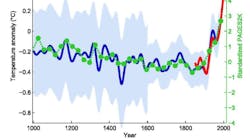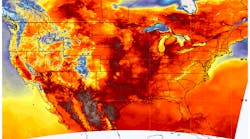Even the most skeptical climate change denier knows that this summer has been abnormally hot.
Every day seems to break yet another record, and it’s not just speculation, since global temperature data dating back to 1850 is available for comparison. Indeed, there is solid data indicating that the Earth has been rapidly warming since 1979, and is now warmer than at any time in recorded history.
But what about the audacious claim, by some climate scientists, that the planet is now the warmest it has been in the past 125,000 years?
That is, of course, the sort of claim that climate change deniers love to pounce on! In this case, however, paleoclimatologists are confident that this truly is the warmest it has been since before the last Ice Age, and other climate scientists are equally confident that human (anthropogenic) activities have contributed to it.
Paleoclimatology, according to NOAA, is “the study of ancient climates prior to the widespread availability of instrumental records,” and this is the science upon which the current claims are based. These paleoclimatologists can study climate proxies specific to the climate characteristics – temperature, precipitation, oxygen levels, etc. – that they are investigating.
In this case, to study ancient temperatures, they can look at a wide variety of data:
- Changes in the layering thickness of mountain glaciers and polar ice caps/ice sheets;
- The ratio of oxygen isotopes O-18 to O-16, which is higher as average ocean surface temperatures increase (this is because water molecules containing O-18 are heavier than those containing the normal O-16, causing them to evaporate at a higher temperature);
- The types of plants in a specific period, since they can relate to the temperature (and the precipitation) at the time (palynologists can help the paleoclimatologists in these observations by analyzing pollen found in ice cores);
- The rings of older trees that have escaped decay, in some cases for a few thousand years, can provide information regarding temperature, precipitation, and other climate characteristics;
- Sedimentary content, studied by geologists, can establish temperatures over a much longer time frame through biomarker molecules and chemical signatures of certain minerals.
Based on these data, and the observation of other phenomena, many scientists – in many disciplines – agree that the temperatures we are experiencing today would have been all but impossible over most of the past millennia.
So why do these scientists believe that this accelerated warming is anthropogenic? According to them, there is no evidence – zero – that global temperatures have ever increased as rapidly as now prior to the burning of fossil fuels and the associated greenhouse gas emissions.
##########
A contributor to HPAC Engineering since 2013 and a member of its editorial advisory board, the author is a principal at Sustainable Performance Solutions LLC, a south Florida-based engineering firm focusing on energy and sustainability. He can be reached at [email protected].










